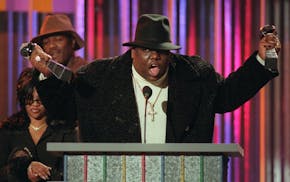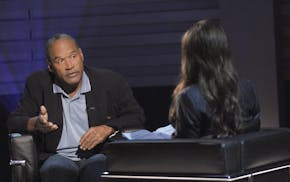Sexual abuse of children can happen anywhere that adults have authority over them. But as the Penn State and Syracuse scandals have recently shown, the culture of sports adds dimensions that can make children particularly vulnerable to sex predators and, perhaps, less likely to report or even recognize abuse.
"We assume that sports is a safe thing for kids, and for the most part it is," said Nicole LaVoi, a sports psychologist and associate director of the University of Minnesota's Tucker Center for Research on Girls & Women in Sports. "But it can provide a grooming ground for sexual predators to find their victims."
Adding to the risk, said Doug Hartmann, a sociologist with the university, is the extent to which coaches are idolized and obeyed without question, and a pervasive attitude that loyalty to a team, school or institution trumps all else.
"Sports in America have always been celebrated for touting high ideals and making great contributions," said Hartmann, who studies the influence of sports on society. "Those ideals make it difficult for people in authority to acknowledge and deal with problems that show cracks in their integrity or honor. And that provides a cover for people who are corrupt to take advantage."
These factors are all being discussed as the sex-abuse scandals currently rocking two college sports teams unfold. Jerry Sandusky, a popular former assistant coach with Penn State's highly revered football program, faces more than 50 charges of abusing boys under age 15. His former boss, Joe Paterno, head coach and one of the most beloved (and winningest) figures in college sports today, was fired in disgrace after being accused of ignoring or attempting to minimize a report of Sandusky raping a boy in the team's locker-room shower.
At Syracuse University, former assistant basketball coach Bernie Fine is being investigated for allegedly molesting two ball boys, and head coach Jim Boeheim has been strongly criticized for initially supporting Fine over the accusers. In the wake of these cases, college sports program officials nationwide are re-examining their policies on reporting abuse and making sure employee training is up to date.
David Wiser, top partner in a Cincinnati marketing firm, said that his heart races when he thinks about the Sandusky case, because it brings back memories of his own abuse at the hands of a coach. He called the parallels "incredible, but not surprising."
Wiser, now 46, grew up in Minneapolis, where 15 years ago he won a $2.6 million judgment against Gary Downing, a longtime coach of the elite traveling baseball team the Little Gophers, for abuse he said happened in 1978, when he was a 13-year-old player for the team.
"If you wanted to be on this team, you did what the guy said, full-stop, or you didn't play," he said. "For a 12-year-old who dreamed of playing pro ball one day, I would rather you cut off my leg than tell me I'm not playing tomorrow."
Wiser never discussed the abuse with friends or his family until he was in his mid-20s.
"I didn't realize it even was abuse till then," he said.
Added shame for boys?
LaVoi and Hartmann agreed that boys victimized by authority figures in the macho, sometimes homophobic male sports culture get dealt extra doses of shame and fear.
Researchers have long emphasized that same-gender adult molestation of children, like the cases being investigated at Penn State and Syracuse, is not an indicator of sexual orientation. But the misperception that it means one or both parties is gay is still common, and can make victims even more anxious and confused.
"When sports and gender intersect like this, a lot more cases than we want to think about are going unreported," LaVoi said.
"Football, in particular, has a long history of connecting power, performance and masculinity, and young boys who follow that model are going to be less likely to come forward and challenge the status quo."
She hopes the current scandals get colleagues thinking about the necessity for broader reform in college sports: "How did we get to a place in college athletics where we're more concerned with protecting high-profile reputations than with the well-being of children?"
She sees the reluctance to report at Penn State as being "unfortunately, all about money. Football is a major part of the economy. They now have a billion-dollar endowment they didn't have before Paterno. The Happy Valley economy is very closely tied to football, and their coaches are demigods. When you link big-time sports to the financial viability of a university, that's dangerous."
Taking action on campus
Colleges nationwide are seizing the moment to re-examine policies and legalities concerning suspicions of child sex abuse.
At the University of Minnesota, President Eric Kaler sent an all-employee e-mail on Nov. 23, directly referencing Penn State and reminding staffers that if they have witnessed a sexual assault on campus or involving a U employee, they are expected to report it to law enforcement right away, and in the case of children, legally required to do so.
"None of us think that we would ever fail to report knowledge about child sexual abuse, but bright lines sometimes become dim when facts are unclear, countervailing influence is strong, or it just seems impossible to believe," Kaler wrote, giving voice to what is on the minds of many administrators.
Athletic director Joel Maturi also took action.
"When you're an athletics administrator at a highly visible school like the U of M, you dread those middle-of-the-night phone calls that someone's been hurt or gotten into trouble," he said. "But when something like this happens, like Penn State, you need to react appropriately, and you need to react immediately," even when the incident occurred at a different school.
His immediate reaction to the Sandusky news was to contact U of M athletes, staff and donors via e-mail to remind them that "the reality is, this kind of thing does happen and we can't be naive to that," he said. "Something could happen tomorrow. We've got to let folks know this isn't something we just pay lip service to. But most important we've got to let the student athletes, all our students, know that it's OK to come forward, and that if you see something happening to someone else, you must come forward."
On Wednesday, Maturi said, university general counsel Mark Rotenberg will give the school's head coaches and other key staffers a refresher course on "what our obligations are under the law" on suspicions of child sexual abuse. One positive result to the Penn State and Syracuse scandals, Maturi said, is that students are now paying attention.
"Let's face it, 18-year-old kids don't tend to listen unless you're talking about something they feel impacts them," he said. "I think they're listening now, and would be more likely to report something if they saw it."
Kristin Tillotson • 612-673-7046

ABBA, Blondie, and the Notorious B.I.G. enter the National Recording Registry
West Virginia transgender sports ban discriminates against teen athlete, appeals court says
Dr. Martens shares plunge to record low after weak US revenue outlook
Visa fees for international artists to tour in the US shot up 250% in April. It could be devastating
